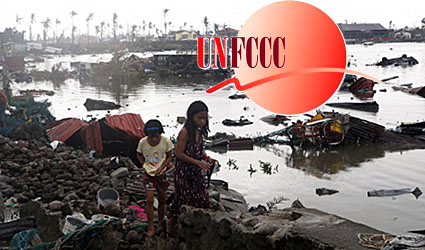 The recent devastation in the Philippines caused by super typhoon Haiyan has lent extra significance to the UN Framework Convention on Climate Change (UNFCCC) 19th Conference of Parties (COP-19) currently underway in Warsaw. (Don’t forget to donate to the typhoon relief efforts, which the Calvin Ayre Foundation has pledged to match up to $1m.) But regardless of how high the Philippine death toll climbs, the only tangible expectation from COP-19 is a better understanding of what to discuss next year so they can hopefully have a new agreement on cutting carbon emissions ready to sign by 2015.
The recent devastation in the Philippines caused by super typhoon Haiyan has lent extra significance to the UN Framework Convention on Climate Change (UNFCCC) 19th Conference of Parties (COP-19) currently underway in Warsaw. (Don’t forget to donate to the typhoon relief efforts, which the Calvin Ayre Foundation has pledged to match up to $1m.) But regardless of how high the Philippine death toll climbs, the only tangible expectation from COP-19 is a better understanding of what to discuss next year so they can hopefully have a new agreement on cutting carbon emissions ready to sign by 2015.
Even at that snail’s pace, getting the planet’s major carbon emitters to adhere to a purely voluntary plan with no enforcement mechanisms is a tall order. The UNFCCC’s previous emission-cutting blueprint, the Kyoto Protocol, has proven utterly ignorable. For instance, Canada ratified Kyoto then stood back and watched as its greenhouse gas emissions shot upward due to Alberta’s oil sands transforming the country into a bona fide petrostate. Canada has now received the Climate Action Network’s ‘Fossil of the Year’ award so many times that organizers are debating reshaping the trophy like the Stanley Cup.
The United States never ratified the treaty, much as it chose not to participate in the International Criminal Court or any other multinational body that might dare constrain America’s God-given right to behave badly on the international stage. China also refused to sign on, arguing that doing so might derail the phenomenal economic surge that’s allowing hundreds of millions of its citizens to attain the middle class comforts that residents of developed nations have long enjoyed.
TIPPING POINT
Failure to curb global emissions means the world continues its creep toward a point of no return. Once the average global temperature rises past a certain point, the ice caps will melt, the permafrost will release its huge stores of methane and the oceans will give off much of the carbon dioxide they held when they were cooler. Once these transformations occur, we’re all screwed. But for the moment, the brunt of climate change is being borne by the outlying nations, and not just at the hands of mega-storms like Haiyan.
Ioane Teitiota, a native of Kiribati, has been fighting a losing battle for refugee status in New Zealand because international law doesn’t grant protection to people whose South Pacific island home is being swallowed by the ocean’s rising tides. A couple years ago, the president of the Maldives held a cabinet meeting underwater in full scuba gear to highlight the threat climate change posed to his nation of low-lying islands in the Indian Ocean.
All coastal communities will invariably suffer from the ocean’s rise. But the developed nations will have an easier time funding relocation efforts and countries like the United States have the extra space in which to accommodate their internally displaced refugees. Few developing nations can boast those types of options.
 PAY UP
PAY UP
With significant emission curbs unlikely, some advocates are attempting to guilt the developed nations into financially compensating developing nations. The argument is that the developed nations are largely responsible for total carbon emissions to date and have reaped all the rewards of the industrial revolution, so maybe it’s time to give something back.
Todd Stern, the US State Department’s point person on climate issues, dismissed this idea last month, not just because the US is dead broke but because “lectures” of this type were likely to produce little more than “antipathy” among governments in the developed world. Stern’s words contain echoes of America’s demonstrated antipathy towards Antigua’s World Trade Organization-supported claims for compensation for the US-led destruction of Antigua’s domestic online gambling industry.
Antigua has threatened to follow through on its WTO-authorized option of seeking compensation via other means, including the royalty-free digital distribution of US intellectual property like Hollywood films, TV shows, music and books. Attorney Mark Mendel, who has represented Antigua in its WTO battle with the US, said the WTO’s purpose in ordering the US to pay Antigua $21m annually was less about compensating Antigua and more about compelling the US to honour its international obligations.
 DO YOU BELIEVE IN MAGIC?
DO YOU BELIEVE IN MAGIC?
Russia is among one of the world’s primary carbon emitters, which is why it pushed so hard to include a mention of geo-engineering in the most recent Intergovernmental Panel on Climate Change report. Geo-engineering involves the shooting of rockets (or extremely powerful artillery shells) laden with sulfur dioxide particles into the earth’s upper atmosphere to mimic the effect of volcanic eruptions, like that of Mount Pinatubo in 1991, which was sufficiently large to produce a 0.5° Celsius drop in global temperatures.
Geo-engineering will likely cause military historians to hear echoes of Adolf Hitler’s boasting late in World War II that his so-called ‘wonder weapons’ would turn the tide of battle in Germany’s favor. While the V1 flying bombs and V2 guided missiles were technically impressive, they were ultimately too little, too late to have any effect on the war’s outcome, which was by then a foregone conclusion. Hitler was deluding himself because the reality of the situation was too terrible to contemplate. Sound familiar?
Geo-engineering is considered a ‘last ditch’ effort, in part because even its staunchest advocates admit that the long-term consequences of artificially seeding the stratosphere with tiny metal filings remain a complete and utter mystery. But listing it as an option solves a far more pressing problem for policy makers: preserving the belief that the fossil fuel party can go on forever.
IT’S UP TO US
There are few politicians out there willing to risk their political career on telling voters uncomfortable truths, namely, that fundamental change in our way of life is necessary if we are to avoid catastrophe. So it’s up to the individual to demonstrate to our leaders that that we’re up to the challenge. Years ago, CalvinAyre.com took the step of shifting its servers to a carbon neutral platform powered by geothermal energy and we continue to seek other ways of minimizing our carbon footprint so that the only hot air spewing forth from this site comes from its writers’ mouths. Who’s up for joining us? Jump in, the water’s warm… and rising.






